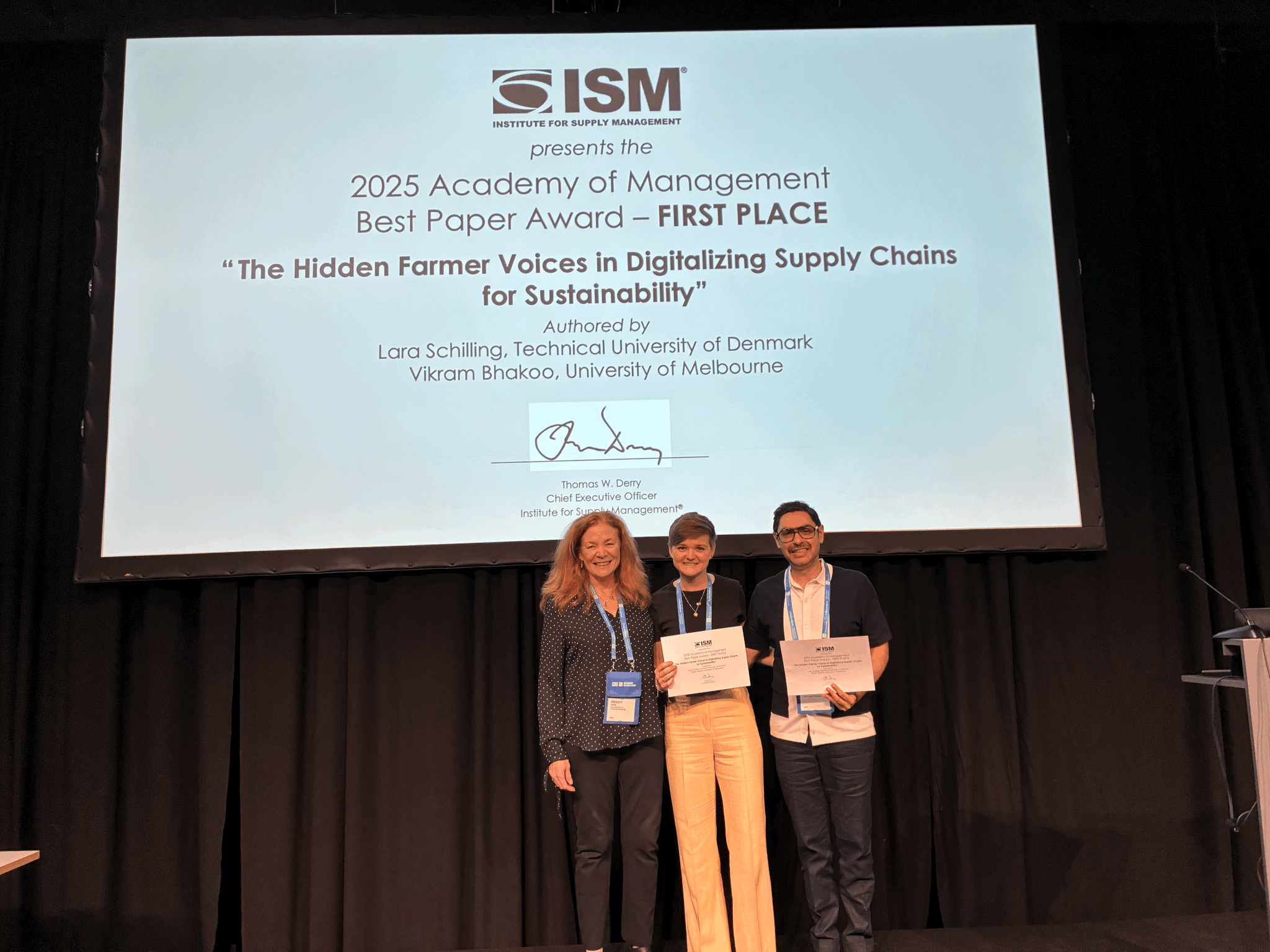The ISM Best Supply Chain Paper Award is sponsored by the Institute for Supply Management (ISM). The selection process has four steps:
- The OSCM Division Program Chair nominates a set of five papers that are candidates for this award.
- These finalist papers are forwarded to the chair of ISM’s Education Resource Committee (ERC) for evaluation.
- The ERC reviews each finalist paper, selects the award winner, and designates the other four papers as “Runner Up”.
- The award winner is announced by the CEO of ISM at the AOM Annual Meeting.
Finalists for the award are selected by the OSCM Division Program Chair based on the ratings and comments received from AOM conference reviewers. The award winner is then chosen from these finalist papers by the ERC following a blind review process. The selection criteria are as follows:
- Significance of the paper to the field of Supply Chain Management (SCM);
- The extent to which the paper is interesting and managerially relevant;
- Theoretical contribution to SCM;
- Use of appropriate methodological rigor;
- Clarity of writing and/or presentation.
2025 ISM Best Supply Chain Paper Award
Winner: The Hidden Farmer Voices in Digitalizing Supply Chains for Sustainability
Lara Schilling (Technical University of Denmark) and Vikram Bhakoo (University of Melbourne)

Finalists
Effects of Supplier Awards on Buyer-Supplier Relationships: Evidence from the Automobile Industry
Genjiro Kosaka, Toshimitsu Ueta
Dyadic Analysis of the Buyer Production Growth Impact on Supplier Emissions in Aerospace Industry
Iryna Malacina, Jaan-Pauli Kimpimäki, Anni-Kaisa Kahkonen, Axel Zehendner, Aleksi Harju
Adapt Supply Networks for Resilience: Impacts of Geopolitical Disruption and Institutional Distance
Shunyu Ji, Sinéad Roden, Byung-gak Son, Jens Roehrich
Investor Reactions to Supplier Exploitation: Threat or Opportunity for Buying Firms?
Seongtae Kim, Sangho Chae, Han Kyul
j
2025 ISM Best Supply Chain Paper Award Winner Feature
Interview Coming Soon
Congratulations on winning this award, Lara and Vikram! What motivated you to conduct this award-winning research?
Both of us are inspired by addressing some of the grand and complex challenges of our time! We are fortunate to have been acclimatized to contexts in Asia and Africa - Vikram through working in his family textile business in India, and more recently, the Thai seafood sector, and for Lara, it was her visit to Ghana while in school and a research project set in the dairy industry in Pakistan. We recognized that communities in Asia and Africa are culturally different, which impacts how they operate. Through our reading and recent projects, we noticed that multinational companies were implementing several traceability technologies for downstream actors in the supply chain. Therefore, we wanted to understand when (Western) multinationals, particularly in the commodity supply chains such as cocoa, implement traceability technologies grounded in “Western” principles of transparency and monitoring how they are perceived and adopted by farmers on the ground. Farmer voices are often muted and diluted. We wanted to bring the voice of the farmers to the forefront. To do justice to such a study, we needed to conduct an ethnography, which is rare and challenging in our discipline, but that would provide an accurate and authentic account of “how things work” on the ground.
What is the most interesting outcome of your awarded AOM paper?
While we anticipated potential tensions between local and Western management approaches during the implementation of technology solutions, we were surprised to find that, in some cases, these technologies had a detrimental impact on farmers. Several unintended consequences arose, such as reinforcing farmers’ dependencies through external data ownership and monitoring mechanisms that consumed their time and financial resources. These effects were particularly pronounced when the technologies were implemented without a deep and sensitive understanding of the local context, failing to strengthen relational ties.
What are your future plans? How will you continue this work?
We are truly fascinated and intrigued by the insights generated by ethnographic research. Moving forward, we plan to delve deeper into the lives of Ghanaian cocoa farmers to better understand how regenerative supply chains can be shaped and sustained by their worldviews, practices, and knowledge systems. Beyond academia, we aim to have a societal and practical impact through our work by improving the lives of cocoa farmers and encouraging multinational companies to redesign their policies and strategies for implementing digital technologies.
Thank you for sharing !
Past ISM Best Supply Chain Paper Awards
2024 Juliette Engelhart, Jens Roehrich, Brian Squire: "Coordinating supplier-induced disruptions through governance mechanisms"
2023 Enrico Fontana, Cranfield School of Management; Mohammad Atif, EDC Paris Business School: "Sub-suppliers’ Customer Share of Production and Sustainability Compliance in Apparel Supply Chains"
2022 Jesus Diego Castillo, Universidad Carlos III de Madrid; Maria J. Montes-Sancho, Universidad Carlos III de Madrid; Zhaohui Wu, Oregon State University "Cognitive and Structural Embeddedness of the Supply Base: Effects on Buyer Profitability"
2021 Pankaj Kumar, Agnieszka Nowinska, Hans-Joachim Schramm "Supplier’s Network Churn, Buyer-Supplier Embeddedness, and Transaction Price Outcomes"
2020 Yanji Duan, University of North Florida; Christian Hofer, University of Arkansas; John Aloysius, University of Arkansas "Transparency in the Supply Chain: Do Firms Benefit by Disclosing Supplier Monitoring Activities?"
2019 Marcus A. Bellamy, Boston U., Suvrat Dhanorkar, PSU, Ravi Subramanian, Georgia Institute of Technology “Supply Chain Network Structure and Environmental Information Disclosure”
2018 Henrik Franke, German Graduate School of Management and Law; Kai Foerstl, German Graduate School of Management and Law "How Rational are Sourcing Teams? The Effect of Goals and Knowledge on Politics and Rationality"